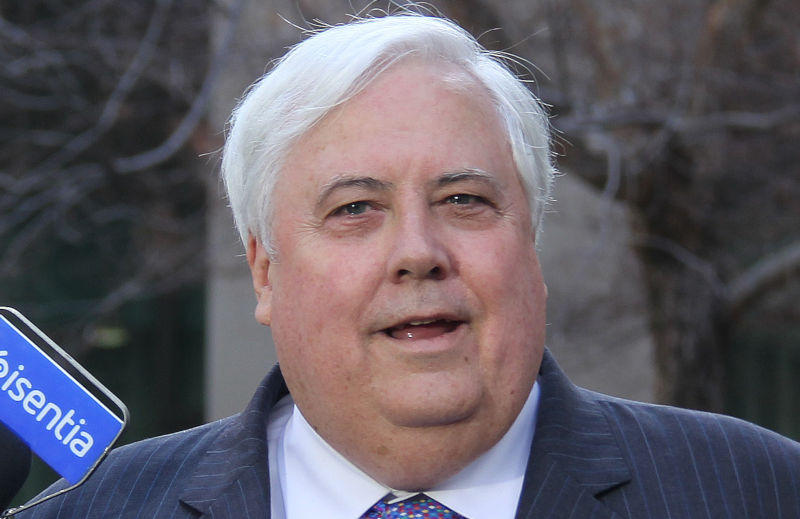What price democracy?
April 11, 2022
_For the second successive election, billionaire Clive Palmer is using his wealth to try to determine or at least significantly influence who will govern the country for the next three years.
_
As was the case in 2019, Mr Palmer is spending at least $70 million on advertising, more than all the major parties combined.
He spent about $84 million at the last election, but failed to win a seat. If the same thing happens at this election he says he wont necessarily consider that a failure.
However although he and his party may not harvest sufficient votes to give them a place in the new Parliament, his money could well distort the election result.
Mr Palmer rejects any criticism of his spending. Suddenly, if I want to say something, our party wants to say something, its a threat to democracy, and I just dont accept it, he says.
No-one, however, has been stopping Mr Palmer and his United Australia Party from saying anything (including providing misleading and false information about the Covid epidemic and its treatment). What is of concern - what is outrageous and anti-democratic - is that one man can use his million dollar fortune to dominate public debate and information.
Whether it is effective or not, the sheer quantity of money he is throwing into the election campaign to promote his own interests is obscene, it corrupts our democracy.
According to the High Court, The risk to equal participation posed by the uncontrolled use of wealth may warrant legislative action to ensure, or even enhance, the practical enjoyment of popular sovereignty. That was said by a majority of the court in a case in 2015 (McCloy) that upheld the validity of a NSW law limiting political donations, and banning donations from some particular groups, including property developers.
The judges said, Capping of political donations is a measure that has been adopted by many countries with systems of representative government. It is a means that does not impede the system of representative government for which our Constitution provides.
Queensland followed the NSW lead in limiting donations and also election campaign spending. It is to the discredit of the Morrison Government that it tried to pass Commonwealth legislation both to overturn and to evade the Queensland restrictions. (The High Court ruled that the federal government did not have the constitutional power to do either.)
Worse still, the Morrison Government did absolutely nothing to try to prevent Palmer from using his wealth a second time to undermine the democratic process through his uncontrolled use of wealth as he had in the 2019 elections. This was understandable and predictable given that Palmer used his money against the Labor Party and to help the Liberal and National Parties scrape back into government.
Clearly, the Morrison Government regarded Palmer and his associates as its allies in the electoral battle. It even supported Palmers High Court litigation to overthrown Western Australias health regulations that fenced Palmer out of the State during the Covid pandemic - though it withdrew from the case when it realised that Western Australian voters overwhelmingly supported the quarantining of outsiders.
Palmers crucial support for Morrison in 2019 will not necessarily be repeated in this years election. The estimated $30 million or so he has already spent on advertising has been mainly of the plague on both your houses variety. The various advertisements to date attack, jointly, both the Liberal and Labor parties.
In the 2019 election the Palmer campaign was specially directed against Labor and its then Leader, Bill Shorten. Shortens unpopularity in the end - to which the Palmer campaign would have contributed - was the reason about 2 per cent of voters turned against the Labor Party (according to polling and analysis by the ANUs redoubtable election study). This was enough to have prevented Labor from winning the election.
Palmer appeared to indicate at the National Press Club last week that his campaign from here on (all $40 million worth) will take a different course. He told the National Press Club his personal preference was to put the Greens above both the ALP and the L-NP coalition. Alternatively his party could campaign against sitting MPs (Labor, Liberal and National Party) or possibly against the party that happens to be in government at State level. He will almost certainly do so against Labor in Western Australia, where he has been engaged for several years in a bitter feud, politically and in the courts, with its Labor Premier, Mark McGowan.
Indeed it’s a safe bet that Palmers intervention in the election will ultimately do far more damage to Labor than to Morrison and his supporters.
Preferences, however, do not always go the way they are directed on party how-to-vote cards.
At the 2019 election, Palmers United Australia Party received almost half a million votes - just under 3.5 per cent of the national tally, and about 50,000 more votes than Pauline Hansons One Nation, which had just over 3 per cent.
Almost two-thirds of those who voted for both parties gave their second preferences to the Liberal-National coalition. In Queensland a slightly higher proportions did so (almost 69 percent for Palmer, 67 per cent for Hanson) though the first preferences for both were actually lower in Queensland than nationally.
Recent public opinion polls suggest there has been little if any change in the level of support for Palmers party (or indeed, for Hansons). There is very little to show in the polls for an advertising splurge that rivals that of just about any retailer other than Harvey Norman.
Palmer in particular will probably do better than the rest of his party in Queensland where he is his partys leading candidate in the Senate election, but his current level of support suggests he is most unlikely to win.

